Episode 11: Up in Smoke


Credit: Rachael Bender via Flickr
This week, disagreements over land and money pit neighbor against neighbor. In Vermont, the question is whether to build more wind turbines to help meet the state’s ambitious renewable energy goals. In Rhode Island, the fight is over which kinds of farmers get government help buying land. And with referendums that would legalize marijuana for recreational use on the ballot in Massachusetts and Maine, what’s the potential for a new black market in neighboring states?
Plus, we get inside the head of the kind of embezzler who makes big news in a small state, and we visit an outhouse re-purposed as a ballot box.
This Land Is Whose Land?
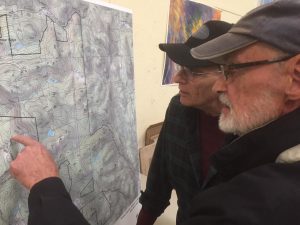
Residents of Windham, Vermont WIndham, look over a map of the new layout for a proposed wind development. (Credit: Howard Weiss-Tissman/ VPR)
Voters in the Vermont towns of Grafton and Windham will vote soon on a proposal by a Spanish renewable energy company to build that state’s biggest wind farm. Vermont has aggressive clean energy goals — and plans like this are a way the state hopes to meet them. But the project has become politicized — the vote comes in the middle of a race for governor. It’s also raised questions about just how far a big company can go to garner support for a controversial project.
We’re joined by Howard Weiss-Tisman, Southern Vermont correspondent for Vermont Public Radio. You can find his recent report on the wind turbine controversy here. For more, a New York Times story zeroes in on the payments energy developer Iberdrola is offering residents of the two towns where the turbines would be built.
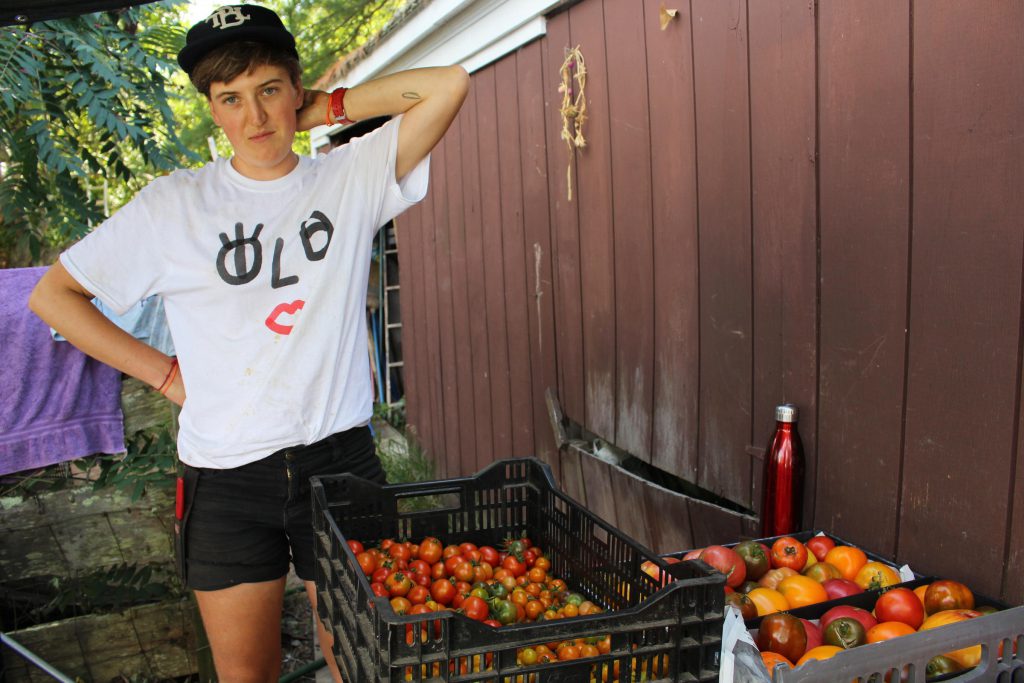
Tess Brown-Lavoie co-founded Sidewalk Ends Farm five years ago in Providence on a small vacant lot that belongs to an absentee landlord. She supports the state’s program to help new farmers access land. (Credit: Ambar Espinoza/ RIPR)
In Southern New England land is scarce. That makes farming really expensive. In fact, Rhode Island is the most expensive place to grow food in the country. To compensate, the state government has set up a program to acquire open space, and help new farmers buy land.
But that attention paid to these new farmers — part of a “local food” movement that promotes small and organic farming — can cause a rift between them and larger family farms. Rhode Island Public Radio’s Ambar Espinoza reports on this land acquisition plan, and the questions it raises about the government’s role in setting the price of an acre of farmland. You can read Ambar’s story here. For more on the challenges of farming in New England – particularly dairy farming, check out our interview with the producer of the film “Forgotten Farms” in last week’s episode.
Pot on the Ballot: Bootleggers and College Kids
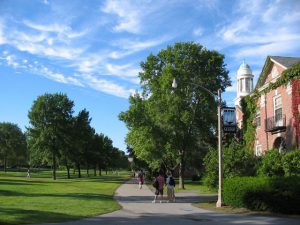
Stephens Hall on the campus of the University of Maine in Orono. Administrators there say they would increase prevention efforts on campus if marijuana is legalized in Maine. To receive federal money, public universities must prohibit marijuana and other drugs on campus. (Credit: Yassie via Wikimeda Commons)
When voters in Massachusetts and Maine head to the polls this November, they’ll be faced with ballot questions about whether to legalize the recreational use of marijuana.
Big money has flowed into the campaigns on both sides, sparking arguments about bringing an end to the failed “war on drugs,” over the science of how dangerous the drug is, and how legal pot might affect the ongoing opioid epidemic.
But, as Fred Bever from Maine Public Radio reports, Western states that have already legalized face challenges that some Maine voters are worried about. The concern is over smugglers who set up shop in a “legal” state – and export it to states where it’s illegal, untaxed, and even more profitable.
As voters, college students in Maine might play a big role in whether the ballot question gets passed. Marijuana use on campuses is at its highest level since 1980, but as Maine Public Radio’s Robbie Feinberg reports, students might not see any big changes even if the drug becomes legal.
Both of those stories are part of Maine Public Radio’s reporting series “High Stakes.”

Medical marijuana is legal in Massachusetts. But advocates for full legalization say the state’s seven dispensaries aren’t accessible for many. (Credit: Dank Depot via Flickr)
As Massachusetts considers the question of legal recreational marijuana, it’s doing so with a much different tax model than other states.
The Massachusetts plan starts with only a 3.75 percent excise tax, about half of what Colorado imposes. Opponents say the low tax won’t cover the added medical costs of legalization.
The topic was part of a debate presented by WBUR’s Radio Boston, The John W. McCormack Graduate School of Policy and Global Studies at the University of Massachusetts-Boston, and The Boston Globe.
Small State Crooks and Scatological Democracy
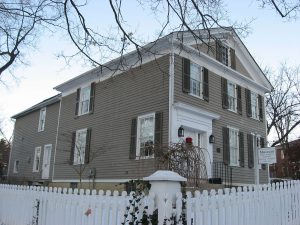
Is your town’s historical society at risk for embezzlement? You might be surprised.
Do a little digging, and you’ll find no shortage of embezzlement stories around New England. There was a tax collector in Anson, Maine for 42 years, who manipulated adding machine tapes to skim the top off excise tax payments when residents registered their cars, stealing over $500,000. A priest in Manchester, New Hampshire who spent diocese money on gifts and travel for a musician he was having an affair with. Also in New Hampshire, employees in three separate towns have been caught siphoning funds from the local historical society.
When a listener of Brave Little State, the people-powered podcast by Vermont Public Radio asked the question: “What’s with the high occurrence of embezzlement cases in Vermont?”, reporter Angela Evancie started her investigation. The answer, to say the least, is complicated. Angela joins us to talk about it. Click here for her original story, along with a readable version.
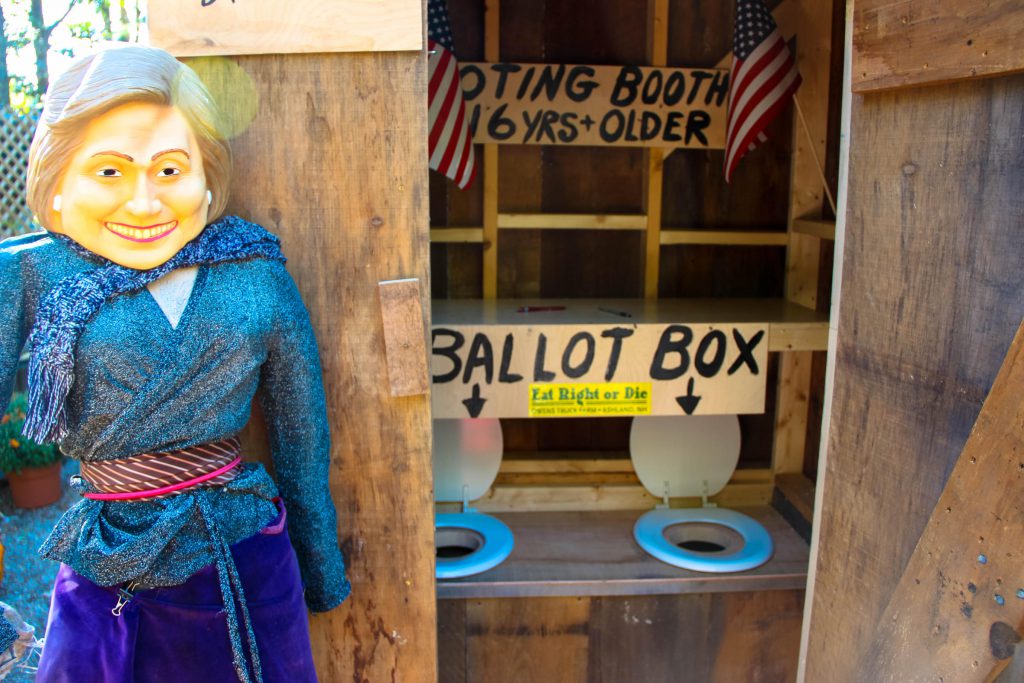
The rare “two-seater” outhouse with a mannequin representing Hillary Clinton. (Credit: Sean Hurley/ NHPR)
Chris Owens always wanted an outhouse at his farm stand in Ashland, New Hampshire. Then during the construction phase, he had a Eureka moment. New Hampshire Public Radio’s Sean Hurley brings us the story. There’s more from Sean here.
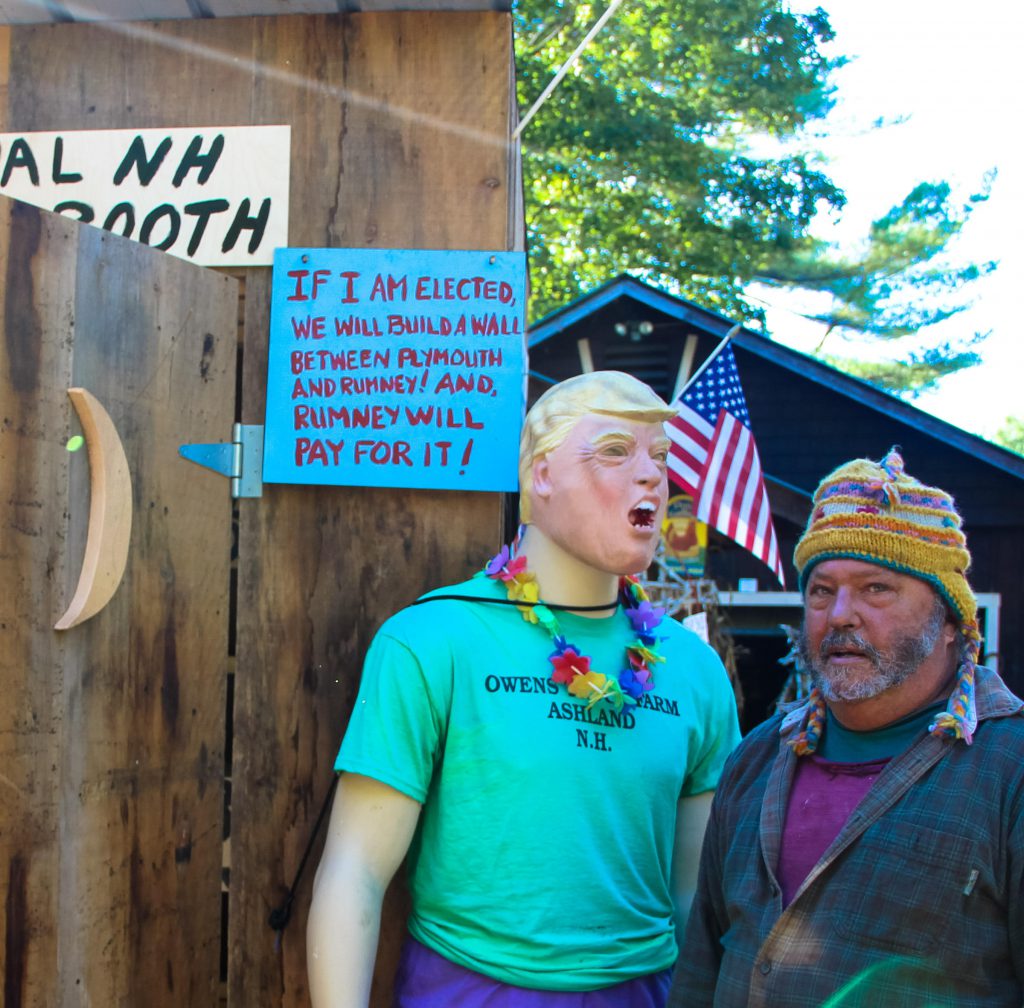
Chris Owens poses with a Donald Trump mannequin outside of his outhouse. (Credit: Sean Hurley/ NHPR)
About NEXT
NEXT is produced at WNPR.
Host: John Dankosky
Producer: Andrea Muraskin
Executive Producer: Catie Talarski
Digital Content Manager/Editor: Heather Brandon
Contributors to this episode: Howard Weiss-Tisman, Ambar Espinoza, Fred Bever, Robbie Feinberg, Angela Evancie, and Sean Hurley
Music: Todd Merrell, “New England” by Goodnight Blue Moon
We appreciate your feedback! Send praise, critique, suggestions, questions, story leads, and embezzlement tales to next@wnpr.org.
